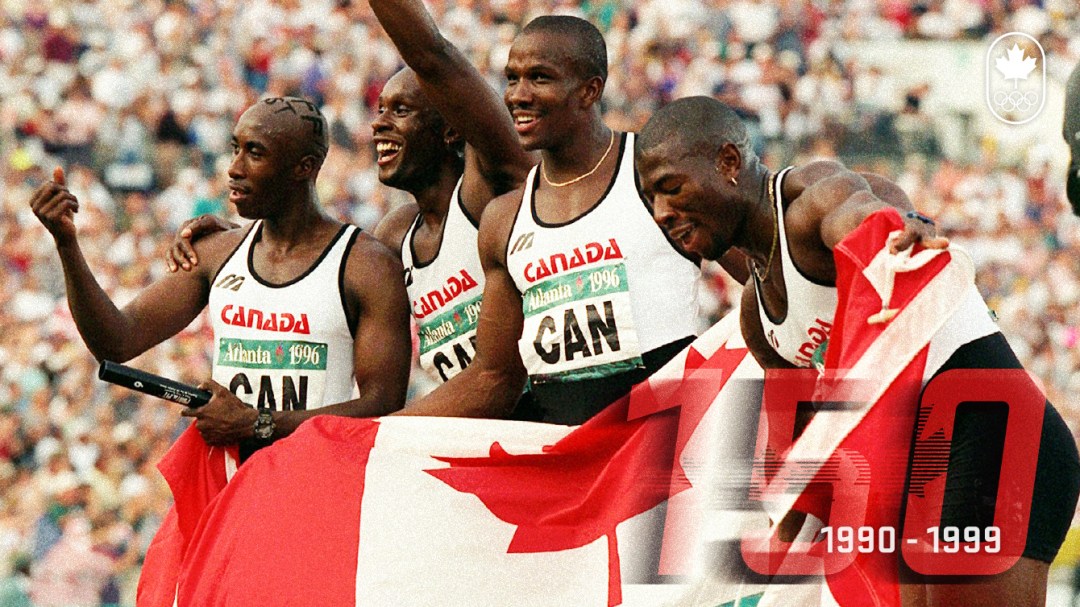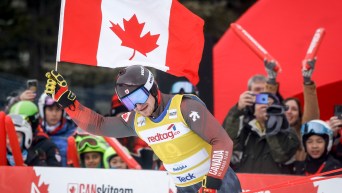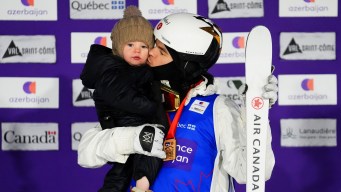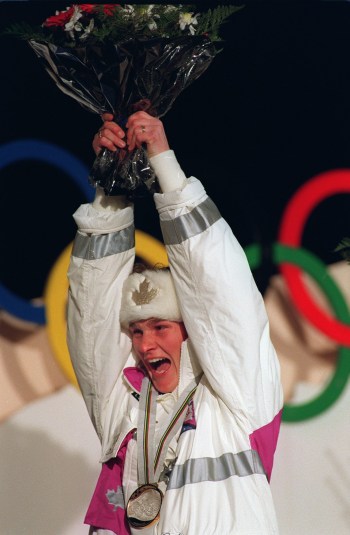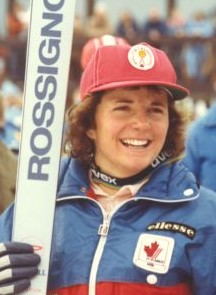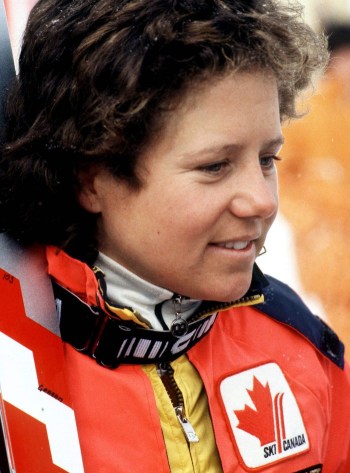150 years of Canadian sport: the 1990s
Only a few decades remain in our countdown to Canada’s 150th birthday celebrations on July 1.
Before diving into some of the country’s greatest sporting moments from the recent past, you can always go back to the beginning here.
Or just read ahead to satisfy your ‘90s nostalgia.
1992 – Canada’s First Olympic Downhill Gold
Heading into Albertville 1992, no one would have predicted that Kerrin Lee-Gartner would become Canada’s first Olympic gold medallist in the downhill. In 10 years of World Cup competition she had only stood on the podium once, finishing third in a December 1990 downhill, although she had posted some close finishes in the months leading up to the Games. But on one of the longest downhill courses in Olympic history, which was thought to be the most difficult women’s course ever, Lee-Gartner proved her mettle. With top contenders Katja Seizinger of Germany and Petra Kronberger of Austria sitting in first and second, Lee-Gartner took the lead by 0.12 of a second. That held up the rest of the way, with American Hilary Lindh posing the biggest threat, but finishing 0.06 back of the Canadian.
1992 – Canada Strong in Short Track’s Official Olympic Debut
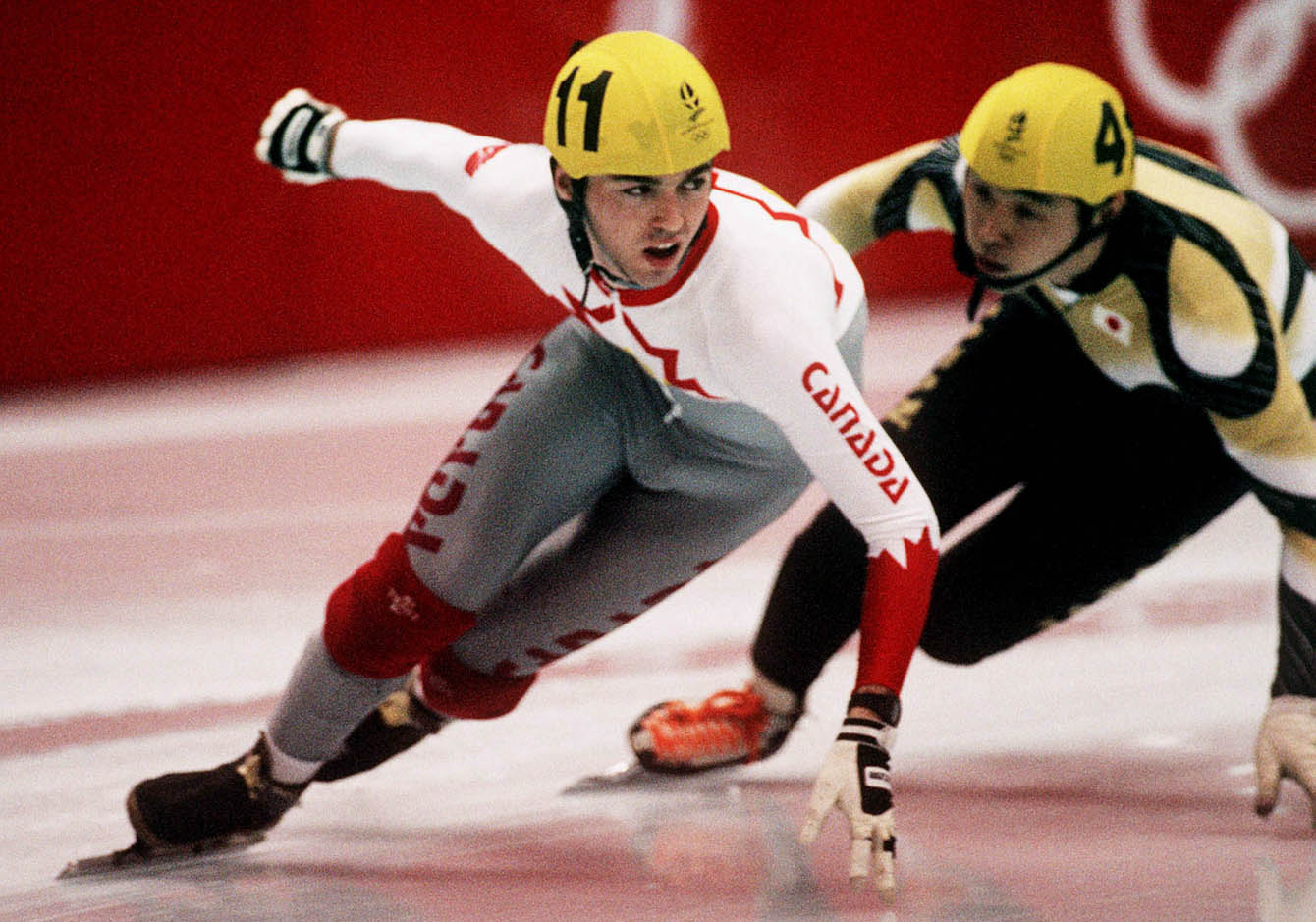
Canada’s Frederic Blackburn (left) competing in the short track speed skating event at the Albertville 1992 Olympic Winter Games. (CP PHOTO/COC/Ted Grant)
Four years after it had demonstration sport status at Calgary 1988, short track speed skating had official medals up for grabs in Albertville. There were just four events – men’s 1000m, women’s 500m, men’s 5000m relay, women’s 3000m relay – but Canada came away with three medals. Frédéric Blackburn won an individual silver and was part of the silver medal-winning men’s relay while Opening Ceremony flagbearer Sylvie Daigle helped Canada win gold in the women’s relay, starting an impressive streak that has seen the Canadian women reach the podium in every Olympic 3000m relay since.
1992 – Laumann Rows to Olympic Bronze after Devastating Collision
As the reigning single sculls world champion, Silken Laumann was a strong gold medal favourite for Barcelona 1992. But at a World Cup in May 1992, she was rammed by the shell of a German men’s pair in an on-water accident. Her right leg was torn open as she suffered a tibia fracture and nerve damage. Despite some thinking she might never row again, Laumann underwent five surgeries and 78 days later was on the water in Barcelona, rowing her way to an Olympic bronze medal in one of the most inspiring performances in history. After carrying the Canadian flag in the Closing Ceremony, Laumann took a year off to fully recover. She returned to win single sculls silver at Atlanta 1996.
1992-1993 – Olympic Gold Better Late Than Never
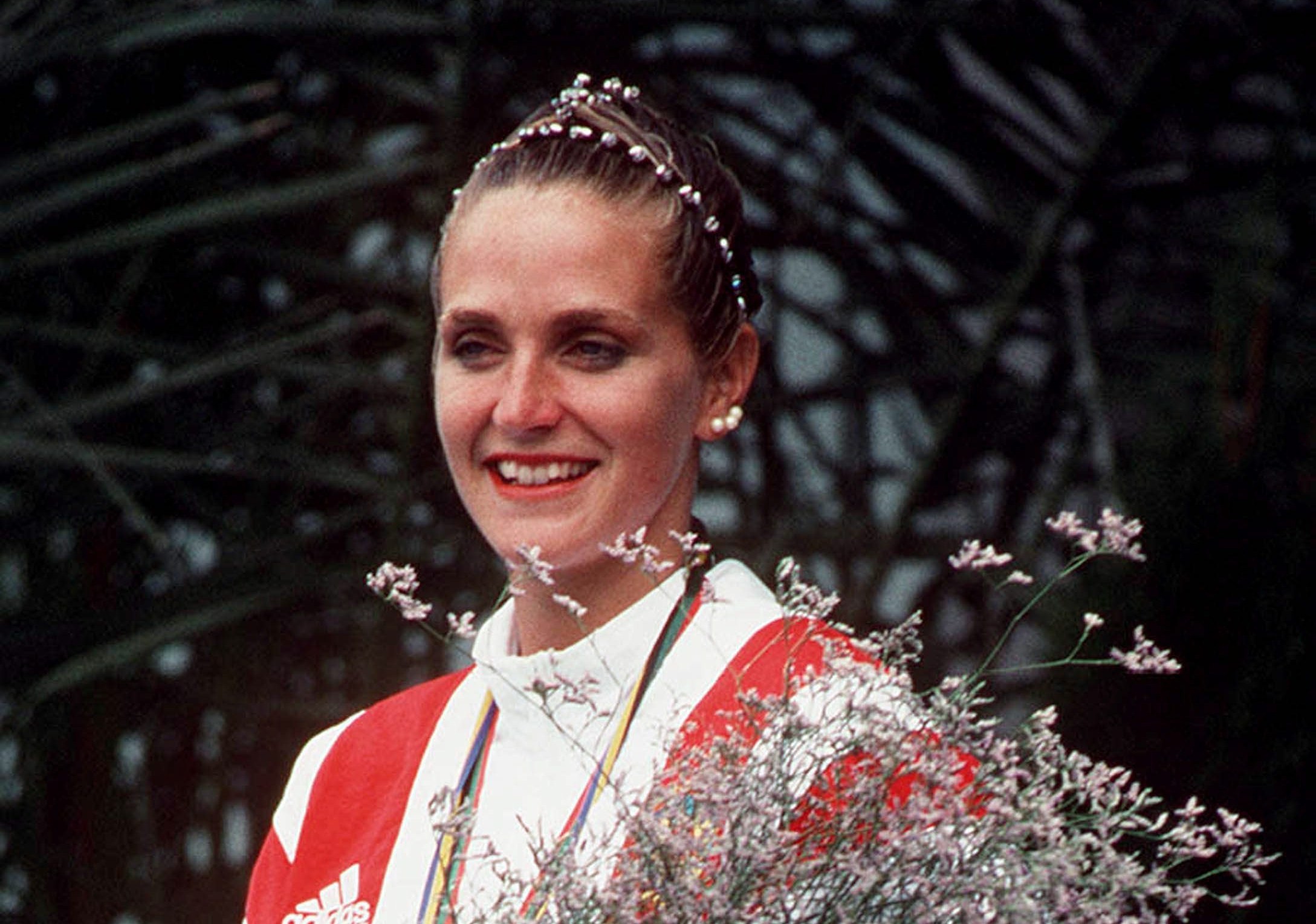
Canada’s Sylvie Fréchette celebrates the silver medal she won in the synchronized swimming event at the 1992 Olympic Games in Barcelona. Due to a judging error at the games, Sylvie was later awarded the gold medal (CP PHOTO/ COC/ Ted Grant)
Sylvie Fréchette was synchronized swimming’s solo world champion in 1991. But just days before the start of Barcelona 1992, her personal life was struck by tragedy when her fiancé committed suicide. Still in a state of shock, she chose to compete, but Fréchette’s Olympic gold medal medal hopes were seemingly dashed in the preliminary round when the Brazilian judge gave her a score of 8.7 for one of her compulsory figures. It was in stark contrast to the other judges, who had scored Fréchette in the range of 9.2 to 9.6. Realizing her error, the judge tried to type in the 9.7 score she wanted to give but it was too late. No matter what Fréchette did in the final, she was too far behind to catch American Kristen Babb-Sprague and came home with a silver medal. In the months that followed, Canadian IOC member Dick Pound worked with FINA, the international governing body, as well as the IOC to rectify the situation. Finally, in December 1993, Fréchette was upgraded to co-Olympic champion with Babb-Sprague and received her gold medal in a ceremony at the Montreal Forum. After a short retirement, Fréchette returned to the pool in late 1994 and won a silver medal in the Olympic debut of the team event at Atlanta 1996.
1992 – Tewksbury’s 100m Backstroke Thriller
Mark Tewksbury was definitely the underdog of the 100m backstroke at Barcelona 1992. He had been the runner-up at the 1991 World Championships to American Jeff Rouse, who had later set the world record at 53.93 seconds in August 1991. In contrast, Tewksbury’s personal best was 55.19 seconds. Not known for being a strong starter, Tewksbury once again had to rally in the second half of Olympic final. Swimming in the lane next to Rouse, he drew even with Rouse with just five metres to go and then out-touched the American at the wall to win by just 0.06 of a second, posting an Olympic record time of 53.98 seconds. No Canadian swimmer would win another Olympic gold until Penny Oleksiak’s breakthrough at Rio 2016.
1994 – “Quebec Air Force” in Force
Freestyle skiing was fully a demonstration sport at Calgary 1988. Four years later at Albertville 1992, moguls was given official medal status. When aerials joined the fold at Lillehammer 1994, Canada won a medal of each colour. Between the two Games, Jean-Luc Brassard had dominated the moguls World Cup circuit, winning the Crystal Globe in 1992-93. As the top qualifier, he was last down the course in the final. He may have been the third-slowest of the 16 skiers, but Brassard’s turns were impeccable, earning perfect scores from four of the five judges and propelling him to the gold medal. One of most enduring images of the Games is him performing his trademark Cossack jump.
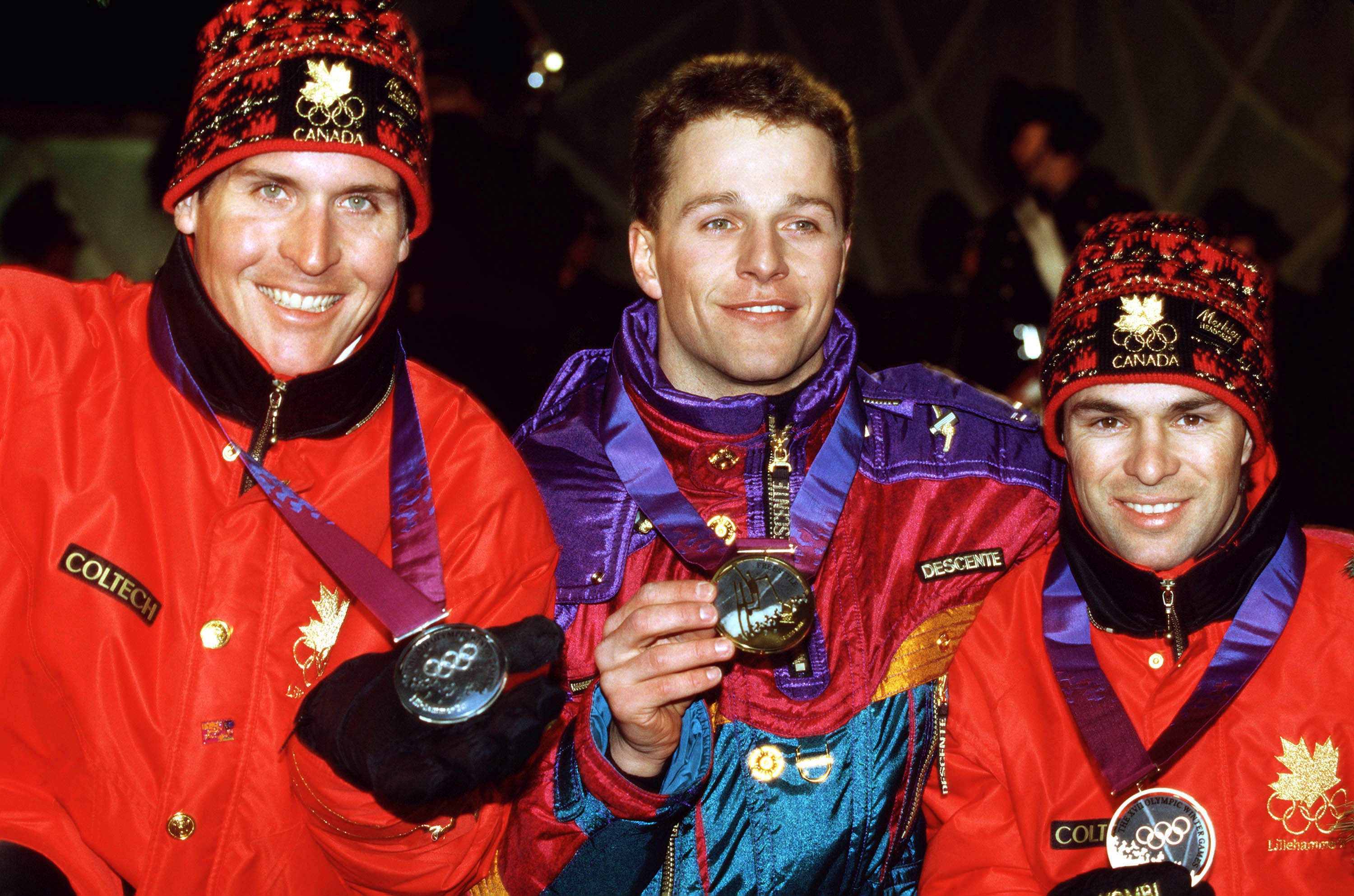
Canada’s Philippe Laroche (left) and Lloyd Langlois (right) celebrate after winning respectively silver and bronze medals in the men’s freestyle skiing aerials event at the Lillehammer 1994 Olympic Winter Games (CP Photo/ COC/Claus Andersen)
On the aerials front, Canada had won gold and silver in the men’s event when it was a demo sport in Albertville, setting up high hopes for the official Olympic debut. Philippe LaRoche, owner of that gold medal, came away with the silver medal from Lillehammer, sharing the podium with bronze medallist teammate Lloyd Langlois. It was the first time two Canadians had won medals in the same Winter Olympic event in 62 years.
1994 – Bedard Doubly Golden in Biathlon
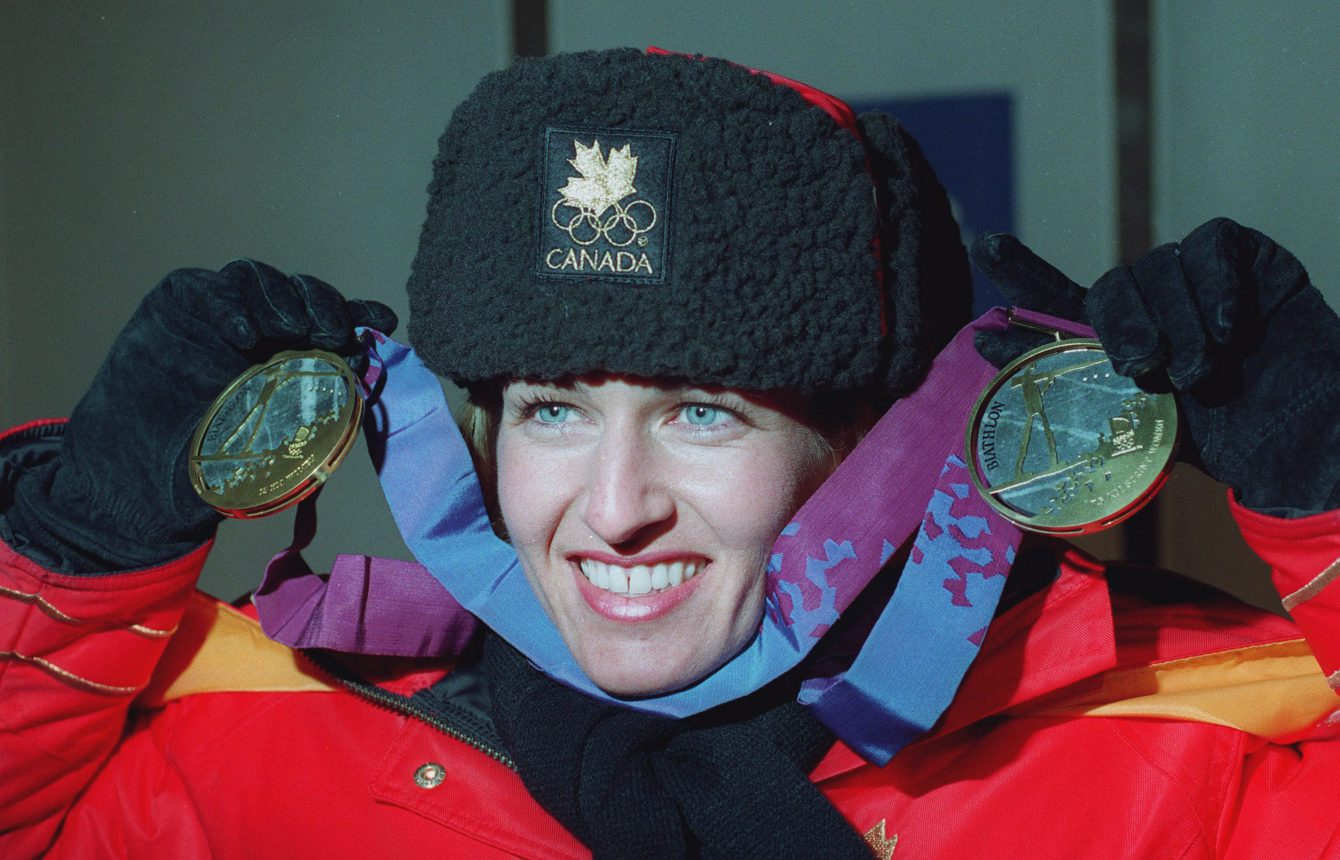
)OLY710) LILLEHAMMER, Canada’s Myriam Bedard shows off her two gold medals following the medal ceremony in Lillehammer Wednesday for the Olympic women’s 7.5km biathlon. Bedard also won the gold in the 15km event. (CP PHOTO) 1994 (stf-Ron Poling)
Olympic biathlon first became open to women at Albertville 1992 where Myriam Bedard broke through with a bronze medal in the 15km individual event for Canada’s first Olympic medal in a Nordic sport. But it was two years later in Lillehammer where she became Canada’s first ever female double gold medallist at the Winter Games. First came the 15km individual, in which she had the sixth-fastest skiing time but with just two missed shots, won the gold by more than 45 seconds. It was a much closer finish five days later in the 7.5km sprint in which Bedard was the reigning world champion. She entered the stadium with just about the same time as the current leaders, but pushed across the finish line to win gold by a mere 1.1 seconds.
1996 – Three Times Gold for McBean and Heddle
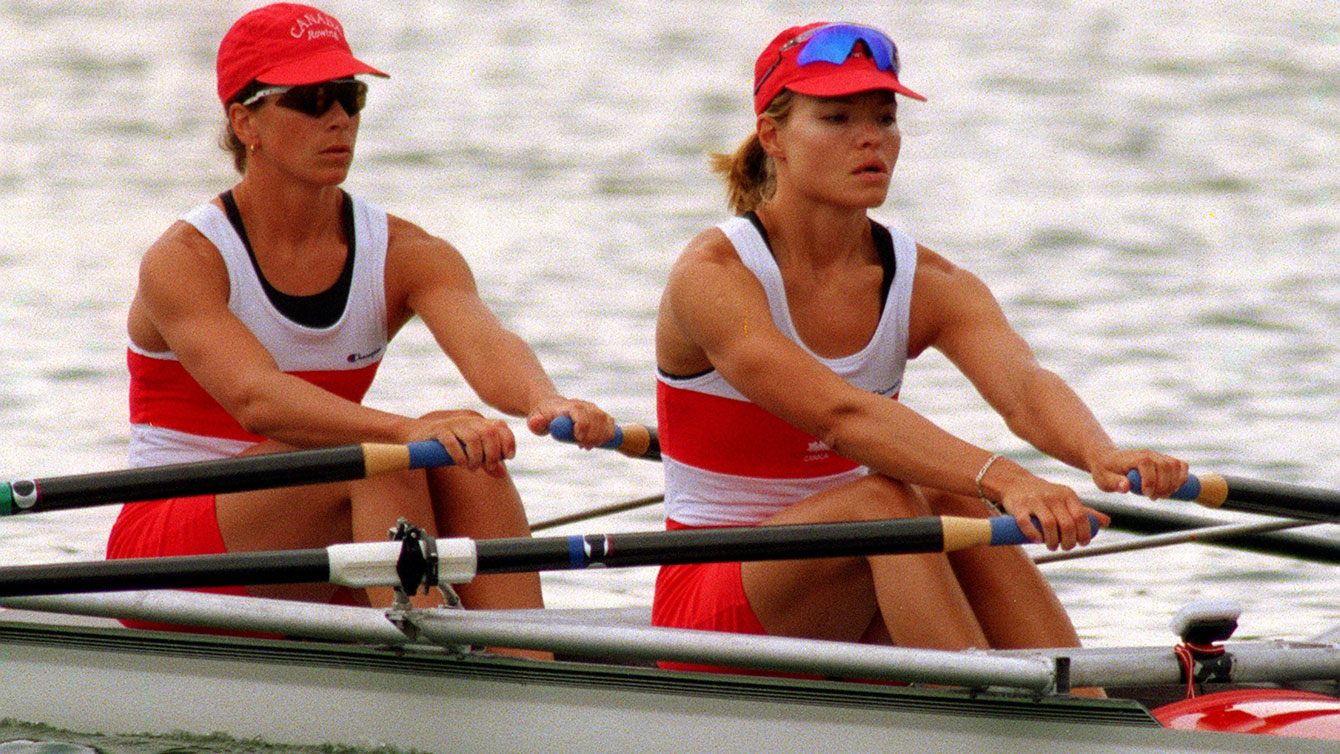
At Atlanta 1996, Marnie McBean & Kathleen Heddle rowed to their third Olympic gold medal in two summer Games.
Canada’s rowing success at Barcelona 1992 included gold medals in three of the six women’s events. On August 1, Marnie McBean and Kathleen Heddle won gold in the pair as did the crew of Kristen Barnes, Brenda Taylor, Jessica Monroe and Kay Worthington in the four. The next day, all six moved into the eight, winning another gold medal. After the Games, Heddle retired so McBean moved into the single scull and won silver at the 1993 World Championships. But when Heddle decided to return to the water in 1994, they shifted to a new challenge together in the double sculls. After a silver at the 1994 Worlds, they won gold in 1995, setting them up as favourites for Atlanta 1996. McBean and Heddle encountered no serious difficulty in winning the final, making them the first Canadian athletes to win three Olympic gold medals. They also added a bronze in Atlanta as members of the quad sculls crew and carried the Canadian flag together in the Closing Ceremony.
1996 – Canada Rules the Sprints
Successive Saturday nights were super special for Canada on the track at Atlanta 1996. On the first full weekend of the Games, the 100m final began with three false starts and a disqualification of 1993 world champion Linford Christie. That led to an eventual slow start, with 1995 world champion Donovan Bailey posting the slowest reaction time in the field. But he quickly gained steam to win in a world record time of 9.84 seconds, giving Canada its first 100m Olympic gold in 68 years.
A week later, a dominant topic of discussion was whether the Americans would allow Carl Lewis to run in the 4x100m relay, despite not qualifying for the team, and win a 10th Olympic gold medal. The U.S. had won gold in the event 14 times previously, only failing to do so either due to boycott or bad baton exchanges. But Canada came in as the reigning world champions and that same lineup took to the track for the Olympic final. Replacing heat runner Carlton Chambers, leadoff man Robert Esmie surprised everyone by having the words “blast off” shaved into his hair. He had a successful handoff to Glenroy Gilbert, who passed the baton to Bruny Surin, who gave it over to Bailey for the anchor leg with a two metre buffer on the Americans. Crossing the line in 37.69 seconds, they were just 0.29 short of the world record but set a national record that would stand until Rio 2016.
1998 – Canada Strikes Gold in Snowboard’s Olympic Debut
The first ever Olympic gold medal in snowboard was awarded on the second day of Nagano 1998. Sitting in eighth place after the first run of the giant slalom, Ross Rebagliati and the rest of the field had to deal with bad weather, including light snow and fog, which caused delays for the second run. After a re-start, Rebagliati posted the second fastest time of the second run, moving him into first place overall. He then watched as first run leader and teammate Jasey-Jay Anderson struggled, giving him the gold medal. But three days later it was announced that Rebagliati had tested positive for marijuana and his medal would be stripped. An appeal was filed and the Court of Arbitration for Sport ruled in Rebagliati’s favour on the basis that marijuana was restricted rather than prohibited. He got to keep the gold medal and his place in the history books.
1998 – Olympic Gold for Schmirler the Curler
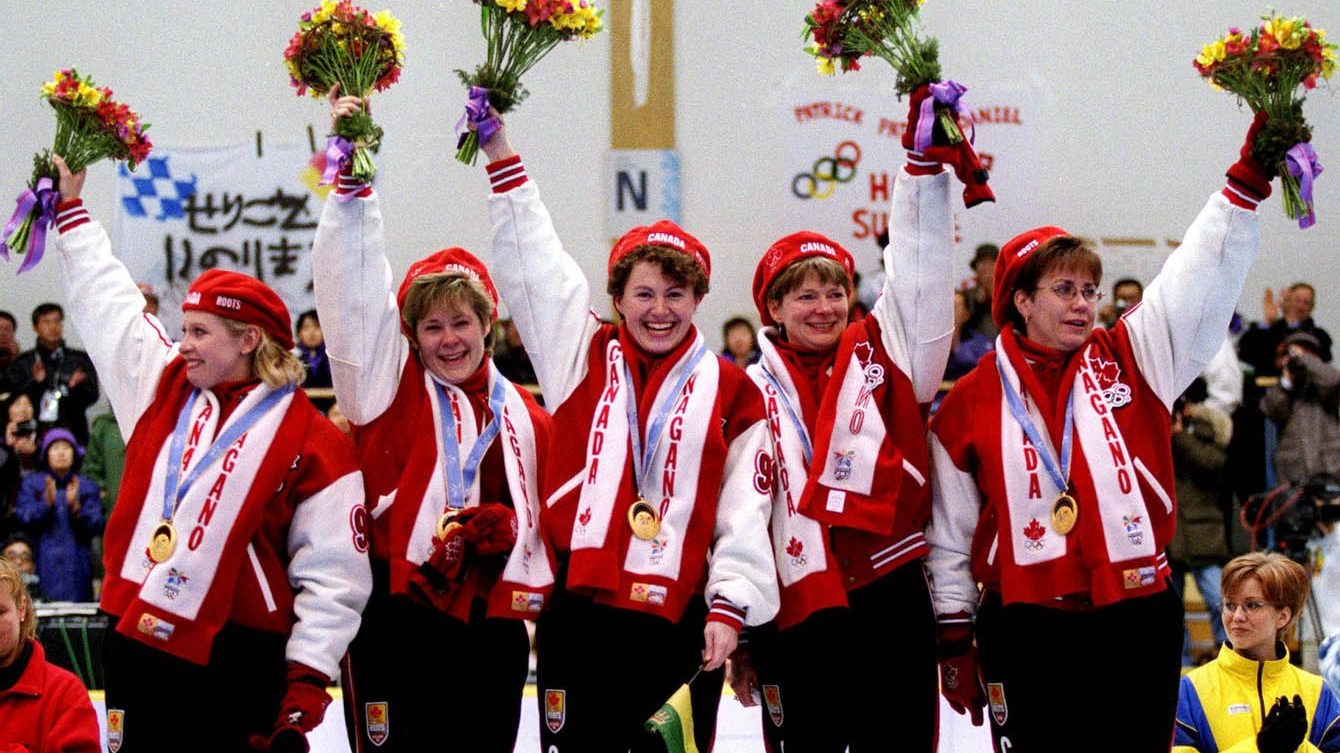
Canada’s Women’s curling team Atina Ford, Marcia Gudereit, Joan McCusker, Jan Betker and Sandra Schmirler after winning a gold medal at the Nagano 1998 Olympic Winter Games. (CP PHOTO/COC)
Nagano 1998 marked the return of curling as an official Olympic medal sport for the first time since the first Winter Games at Chamonix 1924. Canada’s representatives in the first ever women’s tournament were skipped by Sandra Schmirler, who had won the world title in 1993, 1994 and 1997. After finishing first in the round robin with a 6-1 record, the Canadian rink, which also included lead Marcia Gudereit, second Joan McCusker, third Jan Betker and alternate Atina Ford, pulled out a 6-5 extra end win over Great Britain in the semifinals thanks to a shot by Schmirler that held on just enough to stick a few centimetres inside the British stone.
In the final, Schmirler’s team scored three in the first end en route to a 7-5 win over Denmark, securing her status as a legend of the sport. Just two years later, Schmirler passed away after a battle with cancer at the age of 36.
1998 – Rare Bobsleigh Tie for Gold
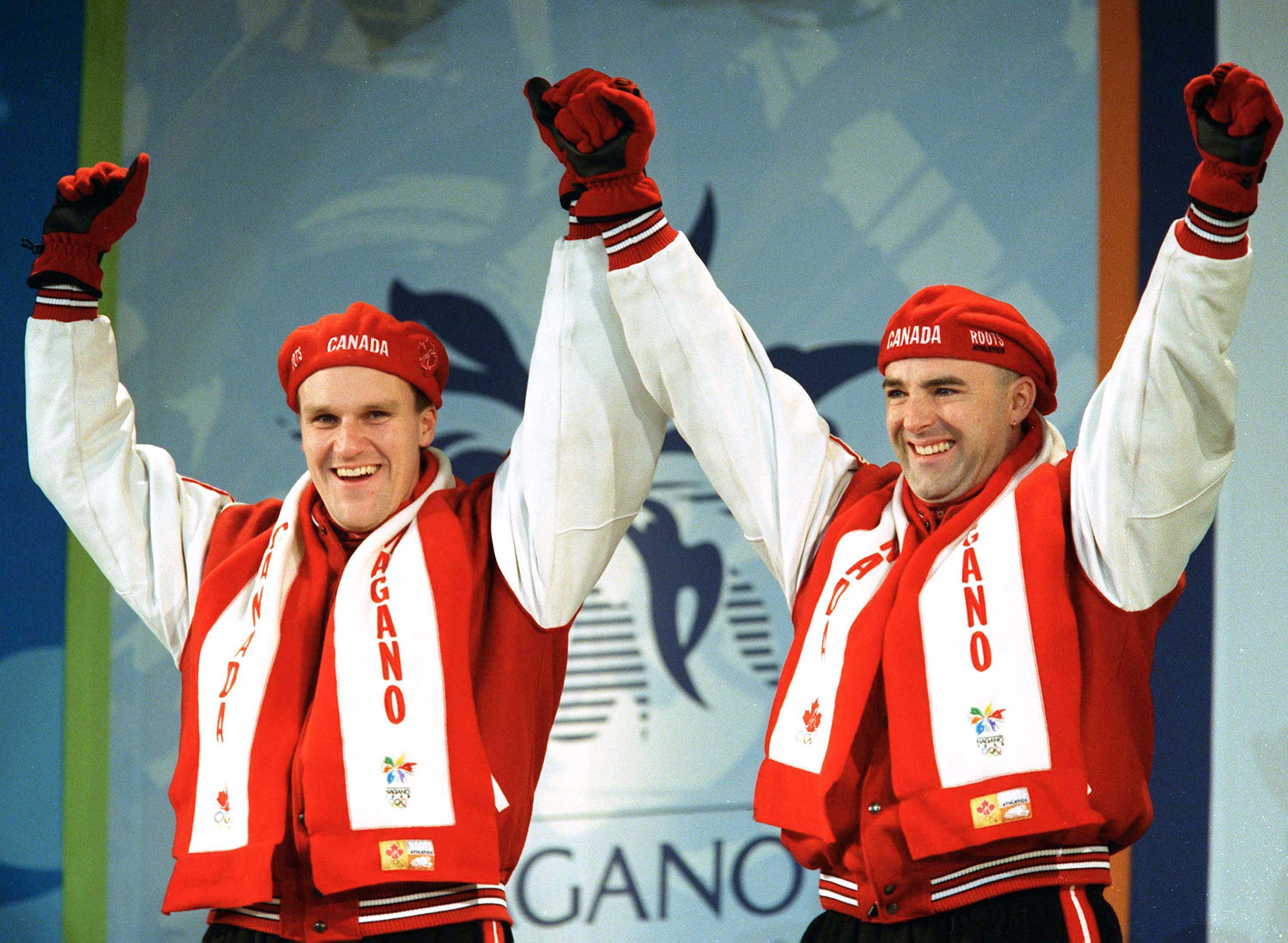
Canada’s Pierre Lueders (left) and Dave MacEachern celebrate their gold medal win in the two-man bobsleigh event at the Nagano 1998 Olympic Winter Games. (CP PHOTO/COC/F. Scott Grant)
Four runs, each timed to the hundredth of a second, and somehow two sleds finish in the exact same cumulative time, resulting in the first ever shared gold medal in Olympic bobsleigh competition. Pierre Lueders and brakeman Dave MacEachern were part of that historic moment at Nagano 1998 as they stood on the top step of the podium with Italy’s Gunther Huber and Antonio Tartaglia. The Canadians had posted the fastest times in the two-man event in the second and fourth runs, making up the 0.03 of a second deficit they were in heading into the final run. It was Canada’s first Olympic bobsleigh medal since Innsbruck 1964. The other two times that two sleds had tied for first place was in the 1968 two-man event, but at the time a tiebreaker was in place to separate the gold and silver medallists. Also at Pyeongchang 2018, Justin Kripps and Alexander Kopacz tied for two-man bobsleigh gold with Germany’s Francesco Friedrich and Thorsten Margis (3:16.86 seconds).
1999 – The Great One Retires
With the inclusion of NHL players in Olympic hockey for the first time at Nagano 1998, Wayne Gretzky was finally able to make his Olympic debut. A year later, he hung up his skates forever, holding or sharing 61 NHL records. Among the most prolific: most career regular season points (2856), most career regular season goals (894), most points in one regular season (215), most goals in one regular season (92). A four-time Stanley Cup Champion with the Edmonton Oilers, Gretzky also won a record four Lou Marsh Trophies as Canada’s Athlete of the Year and was the first player to have his jersey number – the iconic 99 – retired league-wide.

